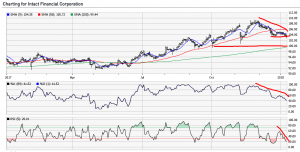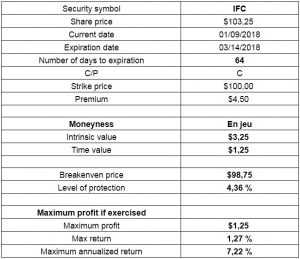Writing covered calls as a hedge against a drop in the shares of Intact Financial Corporation

As the following graph shows, the share price of Intact Financial Corporation (IFC) seems to be on a downward trend as it has just broken through its previous trough at around $104. Its stochastic oscillator (%K) and relative strength index (RSI) are also trending downward.

Since this bearish trend could take IFC down as far as $100, an investor may want to establish a hedge, writing a covered call for each 100 shares held. The price of IFC is now $103.25, so we decide to select calls expiring on April 20, 2018 with a strike of $100. This will provide us with protection at the $100 level and allow us to profit from the options’ time value decay.
Position
• Prior ownership of 1,000 shares of IFC (current price of $103.25)
• Sale of 10 call option contracts IFC 180420 C 100 at $4.50
Credit of $4,500
Profit and loss profile

As you can see in the above table, we entered March 14, 2018 as the expiration date, even though the contract expires on April 20, 2018. This is because a dividend of $0.64 will be paid on IFC shares around March 14, 2018. Since this option has an intrinsic value of $3.25, at this time the most probable scenario is that the owner of the call op-tion will exercise it just before the dividend is paid, in order to capture the dividend. Of course this will only happen if the price of IFC is above $100 on March 14. If we as-sume that it is the case, we should take the expiration date of this option as March 14, 2018. Now we can make our calculations.
This call option is in-the-money with an intrinsic value of $3.25 per share ($103.25 – $100) and a time value of $1.25 per share ($4.50 – $3.25). Selling this call gives us pro-tection against a drop of $4.50 or 4.36% to the breakeven point of $98.75 ($103.25 – $4.50). Should the share price be relatively flat or even rise rather than fall, this position could still generate a maximum profit of $1.25 per share (time value) or 1.27% for the 64-day period to March 14, 2018 (an annualized return of 7.22%) if the options are ex-ercised. So this position allows for a certain margin of error.
Intervention
Since we expect the stock price to decline and maybe even reach $100, we should seri-ously consider the possibility that the price could go even lower, indicating an extreme weakness of the shares. In such case, it would be appropriate to take defensive measures by buying back the call options we wrote and then write some more. Our choice of new call options will depend on how much protection we seek, and for how long.
Good luck with your trading, and have a good week!
The strategies presented in this blog are for information and training purposes on-ly, and should not be interpreted as recommendations to buy or sell any security. As always, you should ensure that you are comfortable with the proposed scenarios and ready to assume all the risks before implementing an option strategy.
President
Monetis Financial Corporation
Martin Noël earned an MBA in Financial Services from UQÀM in 2003. That same year, he was awarded the Fellow of the Institute of Canadian Bankers and a Silver Medal for his remarkable efforts in the Professional Banking Program. Martin began his career in the derivatives field in 1983 as an options market maker for options, on the floor at the Montréal Exchange and for various brokerage firms. He later worked as an options specialist and then went on to become an independent trader. In 1996, Mr. Noël joined the Montréal Exchange as the options market manager, a role that saw him contributing to the development of the Canadian options market. In 2001, he helped found the Montréal Exchange’s Derivatives Institute, where he acted as an educational advisor. Since 2005, Martin has been an instructor at UQÀM, teaching a graduate course on derivatives. Since May 2009, he has dedicated himself full-time to his position as the president of CORPORATION FINANCIÈRE MONÉTIS, a professional trading and financial communications firm. Martin regularly assists with issues related to options at the Montréal Exchange.
The information provided on this website, including financial and economic data, quotes and any analysis or interpretation thereof, is provided solely for information purposes and shall not be construed in any jurisdiction as providing any advice or recommendation with respect to the purchase or sale of any derivative instrument, underlying security or any other financial instrument or as providing legal, accounting, tax, financial or investment advice. Bourse de Montréal Inc. recommends that you consult your own advisors in accordance with your needs before making decision to take into account your particular investment objectives, financial situation and individual needs.
All references on this website to specifications, rules and obligations concerning a product are subject to the rules, policies and procedures of Bourse de Montréal Inc. and its clearinghouse, the Canadian Derivatives Clearing Corporation, which prevail over the content of this website. Although care has been taken in the preparation of the documents published on this website, Bourse de Montréal Inc. and/or its affiliates do not guarantee the accuracy or completeness of the information published on this website and reserve the right to amend or review, at any time and without prior notice, the content of these documents. Neither Bourse de Montréal Inc. nor any of its affiliates, directors, officers, employees or agents shall be liable for any damages, losses or costs incurred as a result of any errors or omissions on this website or of the use of or reliance upon any information appearing on this website.
BAX®, CADC®, CGB®, CGF®, CGZ®, LGB®, MX®, OBX®, OGB®, OIS-MX®, ONX®, SCF®, SXA®, SXB®, SXF®, SXH®, SXM®, SXO®, SXY®, and USX® are registered trademarks of the Bourse. OBW™, OBY™, OBZ™, SXK™, SXJ™, SXU™, SXV™, Montréal Exchange and the Montréal Exchange logo are trademarks of the Bourse. All other trademarks used are the property of their respective owners.
© 2024 Bourse de Montréal Inc. All Rights Reserved.
